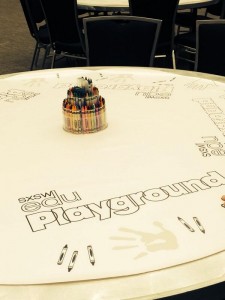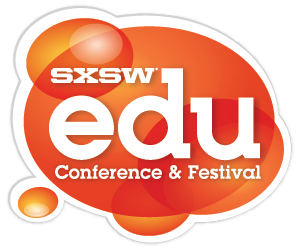
This year the Cooney Center attended SXSWedu in full force, with three separate opportunities to share our work on how teachers, researchers, game developers, and investors are bringing true games-based learning to K-12 classrooms. After presenting with Allisyn Levy of BrainPOP and Julie Evans of Project Tomorrow on Monday, I was able to relax and enjoy the rest of conference, including Michael Levine’s Digital Playground talk on Tuesday and the Games & Learning Publishing Council session later that afternoon. Here are some of the things we saw at SXSWedu 2014:
1) It was NOT all about data, data, data this year! At last year’s SXSWedu conference, there was a clear emphasis on the accumulation and mining of student data, often with the goal of making or saving money for start-up companies or large school districts. However, the programming and participants at this year’s conference had more nuanced attitude about data, focusing on using it as information to make changes in the classroom itself. It was a welcome change of perspective on the topic, and hopefully a trend moving forward in ed-tech development.
2) It was also NOT all about the ed-tech entrepreneur! Perhaps it was the intentionally educator-focused programming that this year’s conference organizers curated, or maybe there was more balanced recruitment from the non-profit and education community, but the overall attendance seemed to include far more educators than in 2013. Some of those educators had feet in both worlds; two Austin-based teachers I met were there to learn more about the ed-tech community in Austin and beyond, as well as let people know about their start-up that provides innovative professional development for those working in special needs classrooms. They gave a positive review of the conference — especially regarding the quality of workshops and panels designed for special educators, and the opportunities those sessions gave them to meet others working in that space.
 3) The Digital Playground/MakerSpace. With BrainPOP in charge of curation, last year’s small, dark room with a few Legos scattered around morphed into a true maker/playspace to explore educational games and fun hands-on activities. Michael Levine gave a short talk on research the Joan Ganz Cooney Center is conducting on the games-based learning space, and lots of teachers stopped by throughout the week to try out new games and get advice from each other on how to integrate these technologies into the classroom. The presence of the Playful Learning, Institute of Play, and MinecraftEDU professional development teams at SXSWedu this year also helped to draw in and support teachers as they experimented with these new learning tools.
3) The Digital Playground/MakerSpace. With BrainPOP in charge of curation, last year’s small, dark room with a few Legos scattered around morphed into a true maker/playspace to explore educational games and fun hands-on activities. Michael Levine gave a short talk on research the Joan Ganz Cooney Center is conducting on the games-based learning space, and lots of teachers stopped by throughout the week to try out new games and get advice from each other on how to integrate these technologies into the classroom. The presence of the Playful Learning, Institute of Play, and MinecraftEDU professional development teams at SXSWedu this year also helped to draw in and support teachers as they experimented with these new learning tools.
4) Plenty of new ideas about teaching & learning at the formal sessions. My experience of most of this year’s sessions was that panelists took care to make their topics come alive and involve the audience in a conversation or debate about how to really evolve teaching and learning as much as possible. Of special note, this year’s LAUNCHedu competition brought in educators to review each company’s product. Ironically, the middle school teacher on the panel found most of the new products TOO staid — they might make use of an innovative or disruptive technology, but encourage the same old pedagogies teachers too often fall back on.
5) Genuinely open and friendly networking opportunities. SXSWedu is known to be a fun education conference with lots of parties and chances to partake of Austin nightlife, but this year the daytime networking was also rewarding. People took time to really connect and share ideas with each other after each session. Some attendees told me that they wished there were even more chances to do that, perhaps as part of an “unconference” or EdCamp portion of the conference next year.
 Not everything was perfect of course — Austin was hit by the notorious “polar vortex” of freezing cold weather right as we arrived (they were even predicting snow!) and the over-packed programming schedule spread across two venues made it challenging to pull together a cohesive learning track. There also weren’t as many sessions on games-based learning as at other education conferences I’ve attended over the last 12 months, which came as a surprise. However, overall this conference was an amazing professional learning opportunity and I hope to be able to participate again in 2015!
Not everything was perfect of course — Austin was hit by the notorious “polar vortex” of freezing cold weather right as we arrived (they were even predicting snow!) and the over-packed programming schedule spread across two venues made it challenging to pull together a cohesive learning track. There also weren’t as many sessions on games-based learning as at other education conferences I’ve attended over the last 12 months, which came as a surprise. However, overall this conference was an amazing professional learning opportunity and I hope to be able to participate again in 2015!



